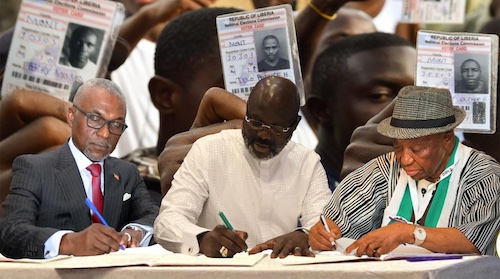
Political parties in Liberia have signed a peace accord to prevent violence that would undermine the conduct of the October 10th presidential and legislative elections.
The overarching objective of the accord, also known as the Farmington River Declaration 2023, is to ensure a nonviolent electoral process, with political actors being cognizant of the need to maintain a peaceful environment before, during, and after the 2023 presidential and general elections.
The signing of that pact is the second in the country’s turbulent political history and builds on the foundation of the initial pledge signed in 2017.
However, it is yet to be seen how the signing of the peace accord by leaders from 27 of 31 political parties would lead to compliance – ensuring that their supporters do not engage in any electoral violence.
The signing of the pact comes a little over two weeks after the start of the biometric voter registration, a process that has been marred by a series of violence castrated by forces from the ruling parties and that of the opposition block.
However, the National Elections Commission, the Economic Community of West African States (ECOWAS), and the United Nations remain hopeful that the signatories of the accord, who in most cases may not directly promote acts of violence may be able to exert influence on their supporters and agents not to unleash violence during the elections.
It is for this reason that the Farmington Accord obliges signatories and their supporters to uphold the principles of peaceful elections and respect the rule of law and resort to constitutional means if they are dissatisfied with the electoral process and outcomes.
The upcoming elections in October, the fourth in the country since the civil war ended in 2003, coinciding with Liberia commemorating 20 years of peace. More so, the upcoming October elections will be the first to be primarily organized and administered by Liberia since the drawdown of the United Nations Peacekeeping Force, which had more than 10,000 troops in Liberia six years ago.”
The election, therefore, is expected to be heavily contested, with the incumbent, Weah, facing strong challenges from former Vice President Joseph Boakai of the former ruling Unity Party and Alexander Cummings of the Collaborating Political Parties, both of whom are considered to be close challengers.”
This pivotal moment, according to the International partner, serves to reinforce progress toward sustainable peace and democracy. Similar views were shared by President George Weah and all other signatories including Boakai and Cummings.
“History has taught us that the risk of post-conflict countries to regress to war is extremely high. By any account, therefore, Liberia is a post-conflict success story,” Weah said. “Today’s signing ceremony is truly another milestone achievement to be admired and celebrated and will actually be put to the test before the elections, through our pre-election campaign activities,” President Weah said at the event
“It will be put to the test on Election Day, and it will be put to the test during the post-election period, particularly after the results are declared. This is when the sincerity of our intentions and the genuineness of our commitment to promoting and preserving peace will come under the highest scrutiny.”
The promotion of peace, according to Weah, is the shared responsibility of all stakeholders in Liberia and must be pursued with sincerity and goodwill, with a view to strengthening Liberia’s democratic credentials and values.
Weah noted that the country’s various political leaders have a duty and responsibility to prevail on its members to desist from actions that could lead to violence,” particularly rhetoric that whips up old divisions and puts tribes and regions against one another.
“Let me, therefore, use this occasion to urge all stakeholders who have a vested interest in the October elections to avoid incendiary language and what I perceive to be a growing culture of militancy, which can have the propensity to quickly spill over into violence.
“And so today, as we sign the 2023 Farmington River Declaration, I call upon all political leaders in this room to ensure that our supporters, and the wider electorate who follow us, will also adhere to the spirit of this Agreement that we have signed before whole World, as we jointly work to fulfill the promises that we have made therein,” the President said.
Meanwhile, Boakai, who is the primary rival to the President, took a slightly different position in a statement after signing the accord. He reminded the international community that they often place a significant emphasis on peaceful elections while leaving out the fundamental principles that govern democratic elections.”
Too often, Boakai said, documents like the Farmington Declaration tend to ignore, neglect and in some cases become complicit with the outcome of the process rather than the actual process itself, which he believes is wrong.
“Let us understand that while ensuring that elections are violent free simply because the people want to be in peace and harmony, it is important, for us to stress the need to monitor those indicators that would undermine the CREDIBILITY of the elections as well as those that will trigger violence,” the opposition Unity Party leader said.
“We are committed to a credible, free, and fair process and I repeat the Credible, Free, fair, and transparent process. The Unity Party, even more than our international partners and the NEC, wants an election that will be free of any form of physical or emotional violence,” Boakai said. “While we are all ensuring that the October 10, 2023 polls will be violent-free, fair, and transparent, we like to remind our partners and the NEC that the mere absence of violence is not the only requirement for a satisfactory election.”
Boakai noted that there are other cardinal ingredients that when not considered and not implemented, there will be a high probability of not having as many violent free elections as “we are all yearning to have.”
“Together with our international partners and mainly the government, we must ensure that these elections are CREDIBLE and in addition monitor the indicators that would lead to the election not being credible, free, fair, transparent, and non-violent. It is, therefore, of key importance that we emphasize and prevent the triggers of violence rather than just stating that ‘we want violence-free elections,’” Boakai noted.
“Cummings, on the other hand, said in a statement after the signing of the accord that his party is committed to a violence-free election. He also called on all parties who are signatories to the document to ensure full adherence to what was signed today.”
“The future of our country lies in the hands of every single person in that room today. We must not take our commitments for granted,” the political leader from the opposition Collaborating Political Parties said.
“Our country is at a crossroads and already, we have had incidents of violence. This must stop. We must protect all persons participating in these elections, especially our female aspirants and protect the sanctity of our electoral process.”
The government, according to Cummings, must also adequately and timely fund the NEC – and in return, the authorities of the electoral body must conduct the elections – with the utmost respect for the constitution and “with transparency, accountability, and credibility.”
” It is my hope that the NEC can swiftly respond to issues of violence, electoral violations, and other issues that may arise during this period. To the Liberian people and Civil Society groups, please continue to hold our feet to the fire and insist on the full implementation of the Farmington Agreement.”
Meanwhile, one of the political wild cards in the race, Allen Brown, who is a standard bearer of the Liberia Restoration Party said in a statement that the agreement promotes stable peace and sustainability which are in the best interest of the Liberian people.
“I’m committed to the democratic process of violence-free, fair, and transparent elections,” Brown said in a post-signing statement. “These elections offer Liberians a choice. A choice between stagnation and restoration.
The signing of the Farmighton Declaration yesterday meanwhile was held in the presence of domestic and international stakeholders to monitor for potential violence – a common feature in Liberia elections.
Along with the presidential candidates, members of observer missions from the African Union, and European Union, and other diplomats were present at the signing.
The UN and ECOWAS signed the agreement as witnesses. On behalf of the United Nations, Giovanie Biha, Deputy Special Representative of the Secretary-General and Acting Head of the UN Office for West Africa and the Sahel (UNOWAS), signed the agreement. Dr. Omar Alieu Touray, President of the ECOWAS Commission, signed on behalf of ECOWAS.















